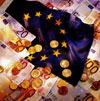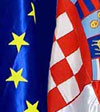

|
Login@Europe
These sites were made as part of a fourth
Login@Europe competition in organization of Ministry of European integration and CARNet. These sponsors to gave support to competition: Ericsson, Nikola Tesla, Siemens, Microsoft Croatia, Končar- INEM, T-com, Senso, Olympus, Vidi and www.odlikasi.hr site. Theme of this years competition is “Let’s meet EU”. The main goal of our site (except of wining) is to inform visitor about European union, her history and structure, her positive and negative sides, actual themes in EU, and news about process of Croatia’s entering to EU. We hope that with contents from this site we will help you to better understand EU, and remove any negative opinions about EU out of your head.
Earls05 |
|

|
|

|
Saturday, 30.04.2005.
 Three new members of EU Latvia, Malta and Cyprus have entered in european exchange mechanism (ERM II), a waiting room for a euro as national currency. New 10 members of EU have to, before putting the euro as their national currency, carry out two years in a band of ERM II. Estonia, Slovenia and Lithuania entered in ERM II last year mid with a goal to levy a euro as national currency. Poland, Hungary, Czech Republic and Slovakia are planning to levy the euro 2009.-2010. Great Britain, Sweden and Denmark, which didn’t want to accept common currency, fought for so called opt-out, possibility to stay out of a Eurozone, and 10 new members, in accordance with front-end contract, have an obligation of levying the euro, but after they fulfill the conditions. Three new members of EU Latvia, Malta and Cyprus have entered in european exchange mechanism (ERM II), a waiting room for a euro as national currency. New 10 members of EU have to, before putting the euro as their national currency, carry out two years in a band of ERM II. Estonia, Slovenia and Lithuania entered in ERM II last year mid with a goal to levy a euro as national currency. Poland, Hungary, Czech Republic and Slovakia are planning to levy the euro 2009.-2010. Great Britain, Sweden and Denmark, which didn’t want to accept common currency, fought for so called opt-out, possibility to stay out of a Eurozone, and 10 new members, in accordance with front-end contract, have an obligation of levying the euro, but after they fulfill the conditions.  Written by: Ivan Čakarić. Written by: Ivan Čakarić.
 Croatia could join to EU 2010., two or three years after Romania’s and Bulgaria’s and more less than Turkey’s entering, predicts the newest number of a weekly magazine ‘’The Economist’’. In the article says that no matter on the French constitution referendum outcome, next extends will be much harder. Croatia could join to EU 2010., two or three years after Romania’s and Bulgaria’s and more less than Turkey’s entering, predicts the newest number of a weekly magazine ‘’The Economist’’. In the article says that no matter on the French constitution referendum outcome, next extends will be much harder.  Written by: Ivan Čakarić. Written by: Ivan Čakarić.
|
| 
 |
|
|
|

|
Did you know? |
|

At the surprise of Germans, the picture of them as a hardworking people which is working all the time, got very questionable after the latest research which showed that they are all the time tired and that, while other Europeans work or have fun, they sleep tightly in their beds. The author of the research Juergen Zulley thinks that the reason for their tiredness is too less sleep during the night. The other reason is their too early waking up. Average waking time of all Germans is around 6 o’clock in the morning, which means that a lot of them wake up even earlier and that is a whole hour earlier before all others Europeans. To stay in bed till 8 o’clock in the morning for the most of the Germans means “to sleep too longer” says Zulley.
|
|
engl/did_you_know.php
|